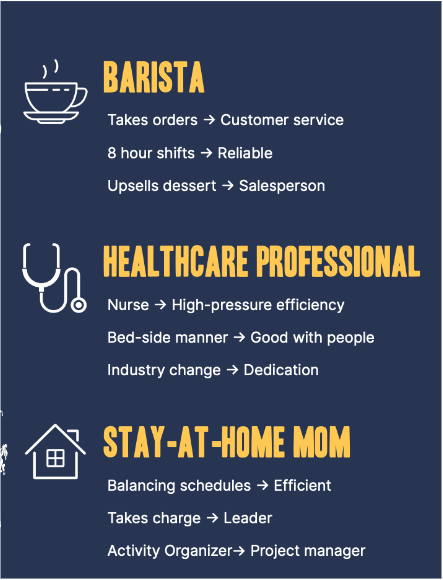Candidates: Are you interviewing and need support?
Skills-based hiring is the idea that efficient hiring isn’t based on line items on a resume like alma maters or job titles—because resumes do little to actually predict success.
And when a third of employers are expecting higher turnover this year than last, today’s TA teams are tasked with finding skilled talent that’s going to be there tomorrow.
One of the facets of skills-based hiring is the idea of transferable skills, the skills that transcend industries. Below we lay out tips that can help you establish practices to identify the skills that build qualified workforces.
Leaning into potential
“Rearview HR” is the idea that past experiences and titles are the only predictors of success, when, in actuality, a candidate is much more than ad hoc details on a resume. And they’re capable of so much more.
It’s why Human Potential Intelligence exists. HireVue provides AI-driven tech specifically designed to unlock potential by assessing skills and competencies that are proven to predict success.
And according to the Hirevue 2024 Global Trends Report, more of today’s leaders are starting to pull away from the traditional methods of evaluating talent.
- 37% of global TA leaders are putting more emphasis on candidates’ future potential and less on past experiences telling us that the old, traditional ways to measure performance are being replaced with human potential and transferable skills
In addition, almost all (96%) of the survey respondents said they are now looking at candidates’ ability to learn new skills, while also assessing for skills that transfer to new responsibilities as roles evolve over time.
-
Identifying transferable skills
According to Forbes, “Every executive should have six foundational and transferable skills in their arsenal: collaboration, communication, creativity, teamwork, technical expertise and leadership.”
And when you break down those transferable skills, you start to realize how fluid they are—they don’t exist in just a handful of industries. For example, retail, hospitality, and customer service roles all require the transferable skills that would make a professional executive. And one of the advantages of identifying transferable skills is that it encourages employees to pursue roles they may not have thought they were qualified for or felt confident in pursuing.

For instance, a business development representative with incredible critical thinking and communication skills might turn into a successful leader of a product team. A supply chain team member accustomed to dealing with complex logistical issues might use their analytical skills to create content for the marketing team.
HireVue Builder gives you science-backed, validated questions specific to the competencies necessary for your role. And with Builder for Live, you can bring consistency and structure to the live interview process in addition to on-demand.
HireVue also offers Find My Fit so teams can present candidates with all roles that they fit—not just the ones they search for. Find My Fit helps easily identify what roles best match candidate potential. After a brief assessment of interests, personality, and background, Find My Fit compares the answers to your organization’s open opportunities, recommending the roles that are the best fit for the candidate. Recommending roles based on the candidate’s interests and soft skills drives candidates to those roles that might be a better fit—and can help expand the diversity of your talent pool.
Read the Guide to Skills-Based Hiring here.
Stay-at-home mom → project manager
Transferable skills are becoming more valued than specific past work experiences. According to the U.S. Department of Labor, the following soft skills play a key role in employment: professionalism, oral and written communication, teamwork, and critical thinking. When it comes to skills-based hiring, it’s important to put tools in place that allow you to assess the hard and soft skills needed for success. Industry means nothing— because the same skills are needed in multiple industries.
Watch below and learn more about why resumes don’t make qualified candidates, but skills do.
Ready to start finding the transferable skills that will fit your roles? Request a demo.



